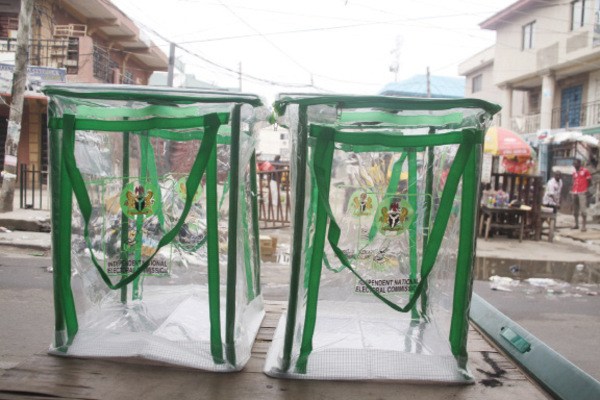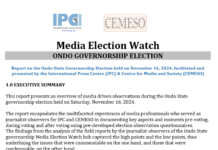Apparently not many people believed that despite Governor Ayodele Fayose’s theatrics and scare mongering, the Ekiti Governorship election would pass off peacefully and, if one may add, successfully.
The build-up to the election was characterised by high drama, fear, anxiety and unprecedented tension. The governor-turned pastor, apart from his vigorous campaign and numerous prayer sessions which he personally conducted, had forecast the fury of hell, with its fire and brimstone, if his anointed successor, Professor Olusola Eleka, deputy governor and the candidate of the Peoples Democratic Party, PDP, did not win the election – presumably rigged out by federal might.
But this prophecy of the apocalypse, a doom of horrendous dimension, did not come to pass. That hell did not break loose was due to many factors: the successful conduct of the election by the electoral umpire which has continued to improve in its organisational capacity – all the electoral materials were deployed in good time, the staff including the temporary ones showed competence and commitment.
The deployment of police and other security agents, about 30,000 in all, though initially regarded by critics as overkill or the militarisation of the civil process, turned out to be an advantage. It helped in no small measure to create sense of security which certainly encouraged voter turn-out. But one must at this juncture pay tribute to the maturity and the political sophistication of the generality of the people who defied all odds to do their civic duties. They were helped by the campaign of various civil society groups aimed at curbing violence, one of them being the campaign of the New Generation Girls and Women Development Initiative whose slogan was “Vote not fight campaign”
The regrettable disruption of the rallies with the use of tear-gas some days to the election did not detract from the overall success of the exercise. The same thing can be said for the shameless display of money and gifts to buy votes. It is, however, difficult to say what effect this had on the choice the voters made. Certainly money had limited, even doubtful efficacy when voters had made up their minds how they intended to vote. For sure they knew the two leading candidates, Dr Kayode Fayemi and Professor Eleka very well.
The two parties had governed the state at various times. Fayemi, the APC candidate, was defeated in 2014 in very controversial circumstances. Fayose who succeeded him had been a two time governor. Their track records certainly swayed the votes either way. The narrow gap between the winner and the loser last weekend showed it was a closely run election. Fayemi defeated his main opponent by only 19,345 votes.
One thing this implies was the clear absence of the blatant use of the so-called federal might in favour of the APC candidate. In other circumstances, in not too distant past, the winner, candidate of the ruling party at the centre, would have run away with jumbo figures. The INEC’s near perfect arrangement has reduced rigging to its barest minimum.
And the determined neutrality of President Muhammadu Buhari to ensure fairness and credibility in the electoral process also ensured that the hitherto shameless manipulation of votes is becoming a thing of the past. Four elections have been conducted under the watch of the president. Three of them, Ondo, Edo and Ekiti were won by the APC, fairly and squarely. In the three cases, there did not appear to be any obtrusive use of the so-called federal might. The fourth election was the one in Anambra. And there was really no contest. Governor Willie Obiano’s outstanding performance won for him an undisputed second term. APC did not flaunt federal might. What this election signals includes the abiding confidence of the electorate in INEC as a neutral umpire. The use of card reader, even with the isolated incidence of malfunctioning, has done much to screen out illegal and unregistered voters. It also shows clearly as in the case of Anmabra State that the choice of candidate matters. A credible candidate with capacity to perform will win election any day in a free and fair contest irrespective of the party and irrespective of the federal might and the Buhari factor.
The Ekiti election and the return of Fayemi to the saddle sends a clear signal, not necessarily as political pundits and other partisans in the presidency have posited, that it will generate a sense of APC triumphalism across the 36 states of the country. It may turn out to be so. But the truth is that Fayemi’s performance side by side with that of the out- going Governor Fayose was central to the fate of the candidates. Though Fayose was not on the ballot paper, this election was all about him, with Eleka, his protégé, playing the second fiddle. If Fayose’s so-called stomach infrastructure, coupled with his notorious executive rascality, had any meaning for the Ekiti voters, if he had been paying salaries of workers promptly as and when due and he was not owing pensioners, his performance would have had a more positive impact on the fortune of Professor Eleka.
On the other hand, Fayemi’s performance during his first coming played a major role in his victory. Despite his elitist disposition – urbane, well- educated and more polished – he did not operate above the heads of the people: he defended and promoted the rule of law and all other tenets of modern democracy; he was neither patronising nor did he ride rough shod over the average Ekiti man or woman. He is on record as always paying salaries of civil servants promptly. By his own admission, he even increased their salaries three times in four years. Instead of sacking any civil servant, he employed more teachers and doctors and he was the first governor to pay special salary for health workers.
Arguably, the Ekiti election is an acid test for President Buhari. If it is not an indication of how the APC will perform in the 2019 presidential election, it has provided some necessary tonic at this time when a combination of unwholesome factors has continued, remorselessly and even mercilessly, to buffet the presidency and cast a dark shadow on prospects for next year. One can therefore understand the euphoria the Fayemi victory in Ekiti state has generated.
In the exuberantly celebratory mood akin to the one by the French people over their second time victory in the World Cup tournament, the Federal government, if not the presidency, saw APC victory as a defeat not only for PDP’s Eleka, clearly a footnote in the narrative, but the routing of Fayose and, in the extravagant words of the quintessential Lai Mohammed, the divisive politics of their traducer, Dr Olusegun Obasanjo.
You would be tempted to wonder if Obasanjo’s name was on the ballot paper. But it matters little. Have you forgotten the axiom which may be appropriate in the circumstance – your enemy’s enemy is your friend. Dr Obasanjo, if you recall, does not see eye to eye with Fayose. But today fate has put them, willy nilly, in the same box.
There are other celebrants outside Ekiti whose reason for celebration has not much to do with the love of party or a feeling of camaraderie with the governor-elect. Those who bank on riding on the back of President Buhari to power or back to power are tempted to read the Ekiti signal wrongly. As the Anambra example has shown, the anticipated federal might may count for nothing with woefully flat-footed and unsuitable candidates.
At the appropriate time, President Buhari would have to distance himself from non-performers because when the chips are down, they would cast a slur on his own personal integrity and his publicly avowed determination to enthrone probity and good governance irrespective of some currently perceived short-comings.
















